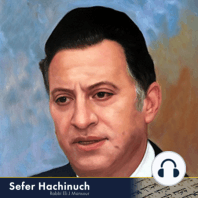20 min listen
Misva #118: The Prohibition Against Offering a Sacrifice Without Salt
FromSefer Hachinuch
ratings:
Length:
20 minutes
Released:
Jan 17, 2022
Format:
Podcast episode
Description
The Torah commands in Parashat Vayikra (2:13), “Ve’lo Tashbit Melah Berit Elokecha Me’al Minhatecha” – “Do not withhold the salt of the covenant of your G-d from upon your offering.” This establishes a prohibition against refraining from adding salt to sacrifices. Adding salt to sacrifices is required by force of both this prohibition, as well as a Misvat Aseh (affirmative command). In discussing the prohibition against offering a sacrifice without salt, the Sefer Ha’hinuch writes that he already discussed the rationale underlying this law in his analysis of the Misvat Aseh to add salt. In the common editions of the Sefer Ha’hinuch, the Misvat Aseh actually appears after the prohibition, but it is clear from this remark that the Sefer Ha’hinuch wrote about the Misva Aseh first. This is because the Sefer Ha’hinuch composed his work by dividing the Misvot Aseh and Misvot Lo Ta’aseh (prohibitions), first discussing the Misvot Aseh in every Parasha, followed by that Parasha’s Misvot Lo Ta’aseh. Naturally, then, he discussed the prohibition against “withholding” salt from sacrifices only after discussing the affirmative command to add salt to sacrifice. In later editions, however, this division was not made, and all the commands – both the Misvot Aseh and the Misvot Lo Ta’aseh – appear in the order in which they are presented in the Torah. The sacrifice must be salted on both sides, but Be’di’abad (after the fact), if even a small amount of salt was added, the Misva has been fulfilled. The salt used for the sacrifice is funded by the public treasury of the Bet Ha’mikdash. The salting was performed in three different locations. There was a special chamber called “Lishkat Ha’melah” (“the salting chamber”) where the hides of the animals offered as sacrifices, which were given to the Kohanim, were salted. Secondly, the animal parts that were placed on the altar were salted on the ramp which led to the top of the altar. Other offerings which were placed on the altar – specifically, grain offerings (Menahot), the Lebona (frankincense) from the Shulhan (table), and the Olat Ha’of (bird sacrifice) – were salted on the top of the altar. Everything that went onto the altar required salting. Of course, this Misva applies only in the times of the Bet Ha’mikdash, and only to the Kohanim. A Kohen who offered a sacrifice without first salting it has transgressed this prohibition and is liable to Malkut. The Ra’a (Rav Aharon Ha’levi, Gerona, Spain, 13 th century) – whom many identify as the author of the anonymous Sefer Ha’hinuch – composed a work called Bedek Ha’bayit, and this book features a discussion about the command to salt sacrifices. In this discussion, the Ra’a writes that the requirement applies not only to the portions of the sacrifices that are placed on the altar, but also to the portions which are eaten by the Kohanim; they, too, must be salted. This directly contradicts the position taken by the Sefer Ha’hinuch, that only portions of offerings which are placed on the altar require salting. This discrepancy between the view taken in Bedek Ha’habit and that taken in Sefer Ha’hinuch would appear to call into question the theory that the Ra’a authored the Sefer Ha’hinuch. As the Minhat Hinuch notes, we must conclude either that the Ra’a changed his position in between the composition of these two works, or that he is not, in fact, the author of the Sefer Ha’hinuch.
Released:
Jan 17, 2022
Format:
Podcast episode
Titles in the series (100)
Misva #3: Gid Ha’nashe: Daily Sefer Hachinuch - Brought to you by itorah.com by Sefer Hachinuch
